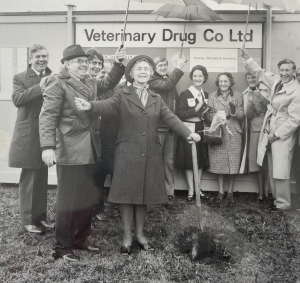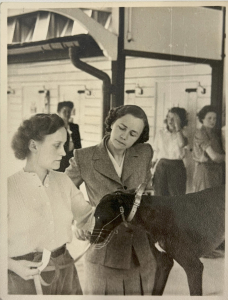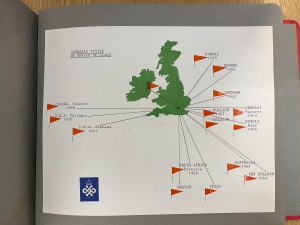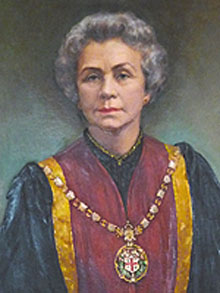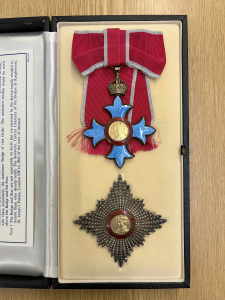In 1976 Olga was unanimously elected President of the RCVS, thus becoming the first female to hold our highest office.[1] She was already well known to the College; she had been a member of RCVS Council since 1968 and in 1971 became the first woman to chair an RCVS committee.[2]
Olga’s commitment to the profession was recognised by many veterinary and scientific organisations, who bestowed on her various prestigious roles and accolades. Her long and distinguished career was a far cry from the traumas of her childhood.
Childhood in Russia
Olga Nikolaevna Uvarov was born in Moscow in 1910. During the Russian Revolution (1917-22) Olga’s father was executed and her mother died of typhoid fever attempting to escape with her children.
Somehow Olga and her three brothers managed to travel the 870 miles to Ouralsk to live with their grandfather. However, life in Ouralsk was no better than in Moscow. Her obituary in the Veterinary Record describes this time as “…horrific months in one room surrounded by starvation and shooting”.[3]
Her uncle, the London-based entomologist Boris Uvarov hoped to transport the children out of Russia using the services of the American Red Cross. However, he was only able to provide enough money to bring one child to London and chose Olga. She eventually arrived in England in 1923, malnourished and suffering from malaria, and having lost her hair and fingernails. She never heard of her brothers again.
Early Years in Practice
As an adult Olga followed in the scientific footsteps of her uncle and chose a path in veterinary medicine. She graduated from the RVC in December 1934 (the forty-second female MRCVS) and joined the practice of Nevill King on Bridge Street, Leatherhead, Surrey.
As well as the practice, Olga was involved in several other projects at this time. She collaborated with King on three papers published in the Veterinary Record in 1935/6.[4] She also undertook animal inspections on behalf of the RSPCA and worked in association with the Ministry of Agriculture on a project researching tuberculosis in cattle.
After ten years in Leatherhead Olga established her own practice in nearby Epsom. She still found time to take on additional roles; She was a keen member of the Society of Women Veterinary Surgeons and was elected as their President for 1947-9. Later she served as President of the Central Veterinary Society for the 1951/2 term.
Glaxo Laboratories
In 1953, after nearly two decades in practice Olga sold her Epsom practice and went to work for Glaxo Laboratories. Initially she worked as assistant to the Head of the Veterinary Department. Much of her work at this time concerned clinical research and the evaluation of medicinal products.
Part of her role involved travelling to Glaxo’s various overseas offices. As well as several European visits Olga travelled to Australia and New Zealand in 1964 and both South Africa and Canada in 1968. Over time Olga rose to become head of Glaxo’s Veterinary Advisory Department, from 1967 until her retirement in 1970.
Olga continued to take on additional roles. From 1955 she served for twenty years as a Local Veterinary Inspector on behalf of the Ministry of Agriculture, Fisheries and Food (MAFF), with special responsibility for the health of laboratory animals exported overseas. Olga also became the first female president of the Association of Veterinary Teachers and Research Workers, for the 1967/8 term.
She also continued her research into various aspects of veterinary treatment, publishing papers in periodicals including the Journal of the Royal Association of British Dairy Farmers, the Proceedings of the British Small Animal Veterinary Association and the Journal of the South African Veterinary Medical Association.
Busy in Retirement
In 1970, the year of her retirement Olga joined the Board of the British Veterinary Association (BVA) as Technical Information Officer, a role she was to fulfil for the next eight years. Her responsibilities for the dissemination of information to the profession included taking an editorial role for the Members’ Supplement newsletter. Olga had a long association with the BVA, having first served on their Council in the 1940s.
In 1971 she undertook an international lecture tour, taking in New Zealand, Australia, the Philippines, Japan, Hong Kong, Malaysia, and India. The topics of her lectures included the use of antibiotics, and methods for the evaluation of new medicinal products. Olga was also a key part of committees established by MAFF in response to the 1968 Medicines Act; she was at various times a member of the Veterinary Products Committee, the Anti-microbial Substances Sub-Committee and the Medicines Commission.
Olga was elected a Fellow of the RCVS in 1973, Junior Vice-President of RCVS in 1975 and President the following year. During her presidency Olga oversaw the RCVS’s response to the Swann Report into the veterinary profession. Although Olga was disappointed that the report was not far-reaching enough, she was able to use its findings to kickstart a review of standards in veterinary education.
Olga also had to deal with the outcomes of a report by the Monopolies and Mergers Committee on advertising of veterinary services – a report which provoked a considerable backlash across the industry by recommending that veterinary practices could advertise in any way they see fit. Olga warned of the dangers of State interference in the affairs of a free profession, especially over this issue of persuasive advertising.[5]
Later Life
Olga continued to write research findings for professional publications into her seventies. Examples include her paper Research with Animals: Requirement, Responsibility, Welfare (1985). In the same year Olga’s expertise was sought by members of the House of Lords for their report Welfare of Laboratory Animals and Legislation. In 1991 she was re-elected vice-president of the Institute of Animal Technology.
In 1979 she became a Fellow of the Royal Veterinary College. This was followed by Honorary Fellowships from the Royal Society of Medicine (1982) and the Institute of Biology (1983). Having been made a CBE in 1978 Olga became a dame in the 1983 New Year’s Honours List, for services to veterinary medicine.
Olga Uvarov died in August 2001 at the age of 91. With her customary dedication to the profession, Olga left a sizeable bequest to the RCVS which was used to fund veterinary research projects.
Olga’s Archive
Olga’s archive contains many of her published papers plus works she collected by other authors. Additionally, there’s correspondence, photographs (both personal and work-related), newspaper articles and many other documents charting her achievements, circumstances and key events in her life. You can find more details of Olga’s archive through our online catalogue, available here: https://www.rcvsarchives.org/TreeBrowse.aspx?src=CalmView.Catalog&field=RefNo&key=OU
References
[1] The minutes of the Council meeting held on 8 June 1976 state “It was unanimously resolved that Dr Olga Uvarov, the Junior Vice-President, be elected President for the year 1976/77”.
[2] Olga chaired the Parliamentary Committee from 1971 to 1974.
[3] Veterinary Record, Volume 149 Number 12, 22 Sep 2001
[4] Urine Analysis (Vet Record 15, 533-55, 1935), Rumentomy in a Bull (Vet Record 15, 668-69, 1935) and Nephritis in the Dog (Vet Record 16, 445-59, 1936). This latter paper was additionally presented to the Central Veterinary Society in March 1936.
[5] Olga outlines her opinions in a speech she made to Council at the end of her presidency. A full typescript can be found in OU/2/9, file 1.

